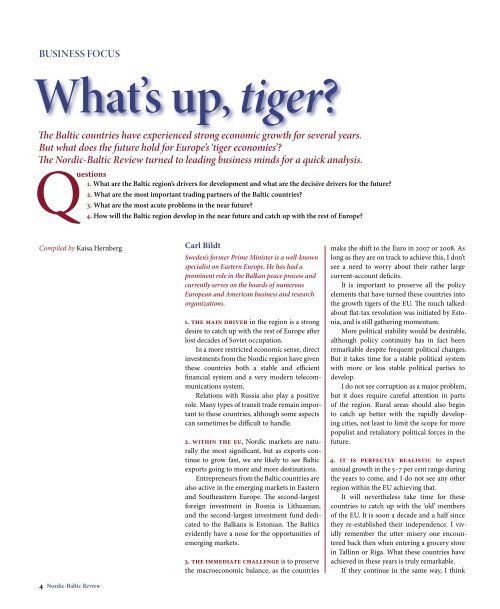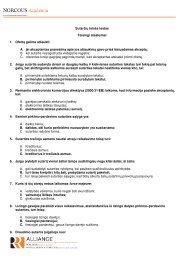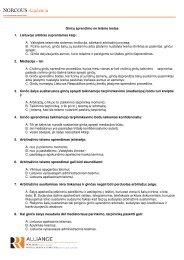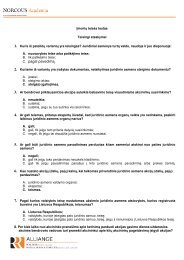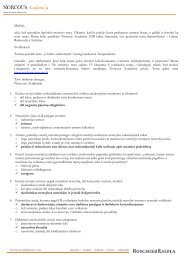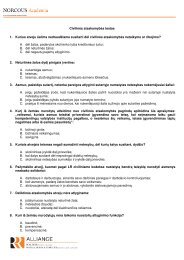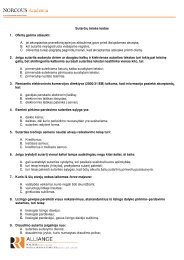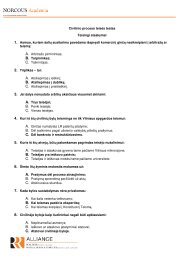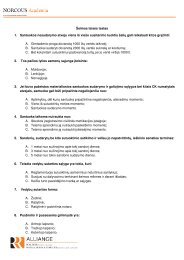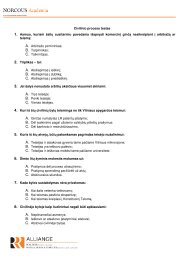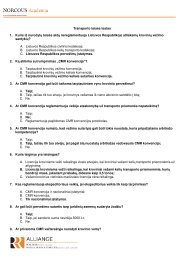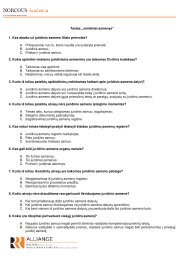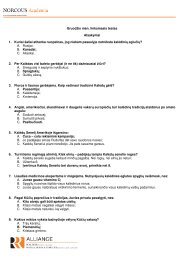Nordic-Baltic Review - NORCOUS Academia
Nordic-Baltic Review - NORCOUS Academia
Nordic-Baltic Review - NORCOUS Academia
You also want an ePaper? Increase the reach of your titles
YUMPU automatically turns print PDFs into web optimized ePapers that Google loves.
BUSINESS FOCUS<br />
What’s up, tiger<br />
The <strong>Baltic</strong> countries have experienced strong economic growth for several years.<br />
But what does the future hold for Europe’s ‘tiger economies’<br />
The <strong>Nordic</strong>-<strong>Baltic</strong> <strong>Review</strong> turned to leading business minds for a quick analysis.<br />
Questions<br />
1. What are the <strong>Baltic</strong> region’s drivers for development and what are the decisive drivers for the future<br />
2. What are the most important trading partners of the <strong>Baltic</strong> countries<br />
3. What are the most acute problems in the near future<br />
4. How will the <strong>Baltic</strong> region develop in the near future and catch up with the rest of Europe<br />
Compiled by Kaisa Hernberg<br />
4 <strong>Nordic</strong>-<strong>Baltic</strong> <strong>Review</strong><br />
Carl Bildt<br />
Sweden’s former Prime Minister is a well-known<br />
specialist on Eastern Europe. He has had a<br />
prominent role in the Balkan peace process and<br />
currently serves on the boards of numerous<br />
European and American business and research<br />
organizations.<br />
1. The main driver in the region is a strong<br />
desire to catch up with the rest of Europe after<br />
lost decades of Soviet occupation.<br />
In a more restricted economic sense, direct<br />
investments from the <strong>Nordic</strong> region have given<br />
these countries both a stable and efficient<br />
financial system and a very modern telecommunications<br />
system.<br />
Relations with Russia also play a positive<br />
role. Many types of transit trade remain important<br />
to these countries, although some aspects<br />
can sometimes be difficult to handle.<br />
2. Within the EU, <strong>Nordic</strong> markets are naturally<br />
the most significant, but as exports continue<br />
to grow fast, we are likely to see <strong>Baltic</strong><br />
exports going to more and more destinations.<br />
Entrepreneurs from the <strong>Baltic</strong> countries are<br />
also active in the emerging markets in Eastern<br />
and Southeastern Europe. The second-largest<br />
foreign investment in Bosnia is Lithuanian,<br />
and the second-largest investment fund dedicated<br />
to the Balkans is Estonian. The <strong>Baltic</strong>s<br />
evidently have a nose for the opportunities of<br />
emerging markets.<br />
3. The immediate challenge is to preserve<br />
the macroeconomic balance, as the countries<br />
make the shift to the Euro in 2007 or 2008. As<br />
long as they are on track to achieve this, I don’t<br />
see a need to worry about their rather large<br />
current-account deficits.<br />
It is important to preserve all the policy<br />
elements that have turned these countries into<br />
the growth tigers of the EU. The much talkedabout<br />
flat-tax revolution was initiated by Estonia,<br />
and is still gathering momentum.<br />
More political stability would be desirable,<br />
although policy continuity has in fact been<br />
remarkable despite frequent political changes.<br />
But it takes time for a stable political system<br />
with more or less stable political parties to<br />
develop.<br />
I do not see corruption as a major problem,<br />
but it does require careful attention in parts<br />
of the region. Rural areas should also begin<br />
to catch up better with the rapidly developing<br />
cities, not least to limit the scope for more<br />
populist and retaliatory political forces in the<br />
future.<br />
4. It is perfectly realistic to expect<br />
annual growth in the 5–7 per cent range during<br />
the years to come, and I do not see any other<br />
region within the EU achieving that.<br />
It will nevertheless take time for these<br />
countries to catch up with the ‘old’ members<br />
of the EU. It is soon a decade and a half since<br />
they re-established their independence. I vividly<br />
remember the utter misery one encountered<br />
back then when entering a grocery store<br />
in Tallinn or Riga. What these countries have<br />
achieved in these years is truly remarkable.<br />
If they continue in the same way, I think


